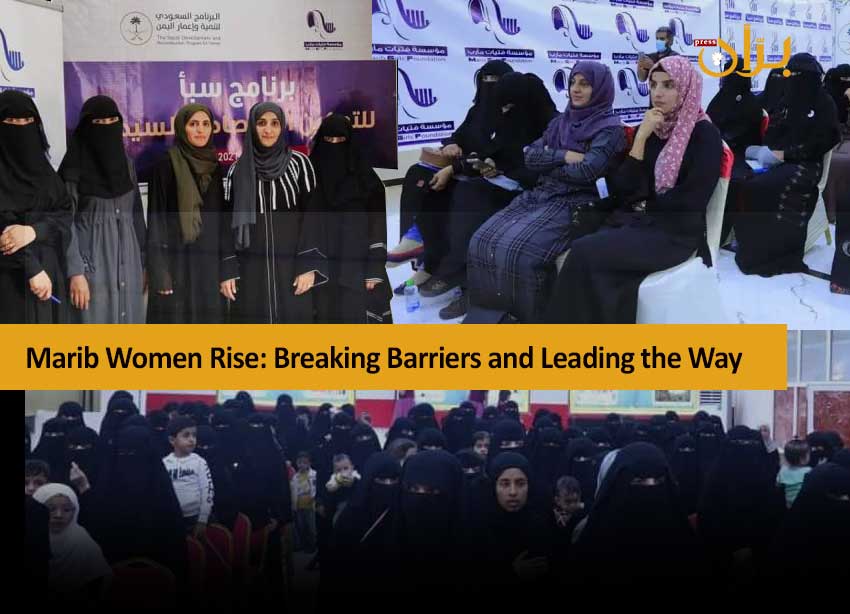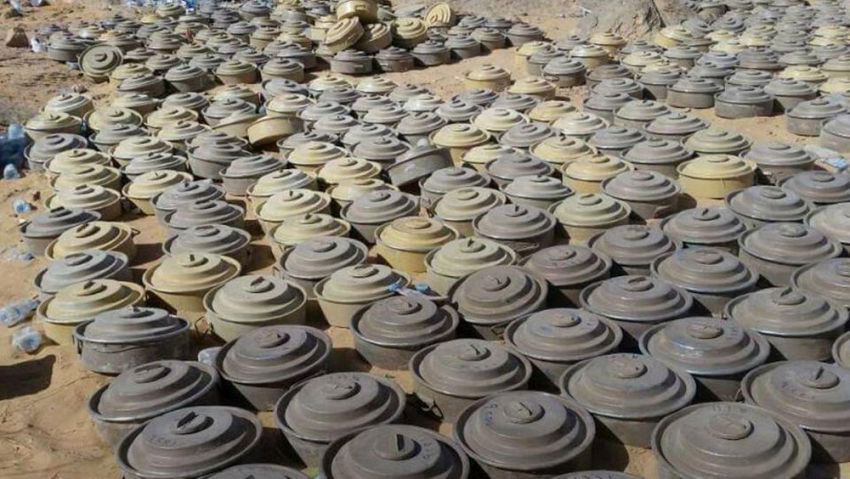
A special report prepared for “Barran Press” - by Amat Al-Ghafoor Al-Suraihi
Amidst the ongoing conflict in Yemen, the governorate of Ma'rib stands as a testament to the resilience and empowerment of women. Despite the challenges posed by war and displacement, women in Ma'rib are actively shaping their future, carving out spaces for themselves in various sectors, and contributing to the region's social and economic development.
A Photographer's Dream Takes Root
Habiba Rajeh, a 28-year-old journalist and photographer, has turned her passion into a thriving business, empowering women in Ma'rib through her photography. Displaced to the governorate in 2018, Habiba recognized a gap in the market for female photographers specializing in women's and children's events. This sparked the creation of "Birwaz Laboratories for Photography and Media Production," a project that quickly gained recognition for its professionalism and commitment to providing high-quality services.
"I wanted to create a space where women felt confident and safe," Habiba explains, highlighting the importance of female-led initiatives in addressing the specific needs of women and children. Birwaz Laboratories has become a leading brand in Ma'rib, offering a range of services from capturing special moments to creating professional media content.
Habiba emphasizes the supportive environment for women in Ma'rib. "The work environment is encouraging," she says, adding that "Yemeni women in Ma'rib hold a prominent position and have received numerous opportunities to participate in various fields over the past nine years."
Habiba's story exemplifies the spirit of female entrepreneurship in Ma'rib, where women are actively shaping their future and contributing to the region's social and economic development. Her success serves as an inspiration for other women in the governorate, demonstrating that with passion, dedication, and a supportive environment, dreams can become reality.
Government Support Fuels Women's Empowerment
In stark contrast to the restrictive environment faced by women in areas controlled by the Houthi group, Ma'rib governorate has emerged as a haven of empowerment for women. Local authorities have actively fostered an environment where women are encouraged to participate in all aspects of society, particularly in public life.
This commitment to women's empowerment is evident in the numerous opportunities provided for women in education, healthcare, and public service. The local government has also implemented programs and initiatives to support women-led businesses, providing training and development opportunities to equip them with the skills needed to succeed.
This official support has translated into a thriving ecosystem for women's initiatives. According to semi-official estimates, there are currently 13 women-led organizations and institutions in Ma'rib, including the Women's Department at the Ministry of Social Affairs and Labor. These organizations are dedicated to addressing the needs and concerns of women in the region.
First Lady Center: A Comprehensive Hub for Women
One shining example of this empowerment is the "First Lady Center," established by businesswoman and project management trainer, Zukra Al-Hamlani. This multi-faceted center, the first of its kind in Ma'rib, offers a wide range of services for women, including a women's gym, a women's cafe, a library, a beauty salon, training rooms for various skills, children's play areas, and consultations on health, nutrition, psychology, law, and investment.
"The idea came from the need for a dedicated space where women could find everything they need for relaxation, training, and development," explains Al-Hamlani. "It's a place where women can feel safe, comfortable, and empowered."
Al-Hamlani emphasizes the strong support for women-led businesses in Ma'rib. "There is a high demand for services, and the governor encourages all projects, big or small, as they contribute to the economic development of the region," she says.
Her advice to women is simple: "Take the initiative and start your own projects. You can be a builder of this society. The opportunities are there, and the environment is encouraging. Leave your mark, make a difference, and contribute to economic development, both for your family and for society."
The success of the First Lady Center and the overall positive environment for women in Ma'rib serve as a powerful testament to the transformative potential of empowering women and providing them with the resources and support they need to thrive.
Civil Society Champions Women's Rights
Civil society organizations are playing a crucial role in advocating for women's rights and supporting their initiatives in Ma'rib.Yasemin Al-Qadi, a prominent figure in Marib's social landscape, is the founder and president of the "Girls of Marib Foundation," one of the most important civil society organizations in the governorate. Her dedication to women's empowerment has earned her international recognition, including the prestigious International Women of Courage Award in 2020.
Al-Qadi emphasizes that the "Girls of Marib Foundation" was the first organization in Marib to be led by women, paving the way for other women-led initiatives. Despite the challenges faced during the foundation's establishment and aftermath, Al-Qadi believes that these obstacles have catalyzed for other women to launch their own organizations and initiatives.
The foundation focuses on supporting and empowering women-led organizations in Marib, enabling them to carry out their activities and contribute to the community's development. Al-Qadi recognizes that women's representation remains limited, and they continue to face challenges in accessing opportunities.
From Public Service to Academia: Women Take the Lead
Fanda Al-Amari, Director General of the Women's Office in Marib, points to the growing presence of women in various sectors. "Women are now holding leadership positions, including Director General and Deputy Director General roles in civil service, health, and other departments," she says. This progress, she attributes to the efforts of Lieutenant General Sultan Al-Arada, a member of the Presidential Leadership Council and Governor of Marib, who has actively promoted women's participation in government and re-activated the National Women's Committee.
The rise of women in public service is mirrored in the education sector. Over 5,000 female students are enrolled in universities across Marib, indicating a significant increase in women's pursuit of higher education. This trend is exemplified by Dr. Badour Al-Mawri, Deputy President of the Saba Regional University for Academic Affairs. Her journey to this leadership position highlights the growing opportunities for women in education and their commitment to academic excellence.
Education: A Pathway to Empowerment
Dr. Badour Al-Maori, Vice President of the University of Sheba Province for Academic Affairs, is a prime example of this positive shift. Her journey to this leadership position is a testament to her dedication and the opportunities available to women in the education sector.
"My nomination for Vice President wasn't a sudden occurrence," Dr. Al-Maori told Barran Press. "It's the culmination of a career and academic progression through multiple stages." She also credits the local authority, particularly Lieutenant General Sultan Al-Arada, the Governor of Marib, for his encouragement of Yemeni women and his commitment to partnering with both men and women based on their competence.
The demand for education among women in Marib is "large," according to Dr. Al-Maori. "The university environment is prepared in all specializations, especially in areas like computers, medicine, and financial sciences," she says. Female students are "strongly motivated towards specializations that the labor market needs," she adds.
This year, the University of Sheba Province has seen a significant turnout of female students, with numbers reaching between 30% and 35%, totaling 929 students across all colleges. This demonstrates the growing presence of women in higher education.
Dr. Al-Maori emphasizes the significant administrative and academic roles women are taking on at the university. "Women have become academic professors, vice president of the university, dean of the college, head of a scientific department, and director of administration," she says. "This indicates that there is encouragement for women and a lack of respect for their rights."
"We trust women's abilities and recognize them as effective members of society," Dr. Al-Maori concludes. She urges women to "work to develop and qualify themselves in the areas where they believe they will excel."





